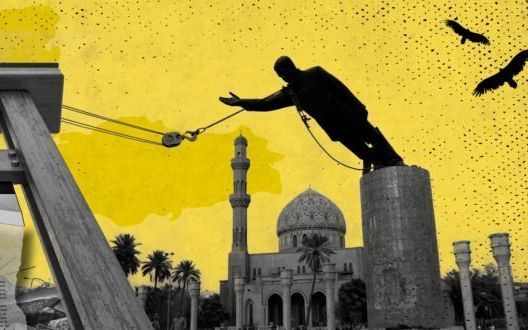Why revolutions are often doomed to fail
25-07-2022
Opinion
Jakob Hoekman, RD

Photo RD
Opinion
Many countries could use a better government in the eyes of many people— for example, Russia, Iran, North Korea and Afghanistan.
There used to be a time when we thought that we could bring about a change of regime. And some Western leaders still seem to think that way. It was tried in Iraq, for example. There, Saddam Hussein was expelled in 2003. But we know the result. Both Sunnite and Shiite militias filled the power vacuum that arose eagerly. That led to the birth of the Islamic State.
The same is true for Libya, where the dictator Ghaddafi was dethroned and lynched in 2011 with NATO's help. That country has not become a more pleasant place either.
Some things have changed the strategy of Western policymakers. There must be a way to remove unwanted dictators without dirtying your own hands. A tested and tried manner since then has been the support of rebels with the hope that these groups will start a successful revolution and change the regime in their own country. But what happens when the Irani people abolish their own terrible government? Or what if the Russian oligarchs revolt and remove Putin?
But it is not that easy to overthrow a government successfully. The most important example of a long-term failure in Syria, of course. The revolution is still ongoing in parts of the country. Still, Syrian President Assad has never been on his throne as stable as since the Syrian war broke out in 2011.
The revolutions in the Arabic world that took place around the same time did not yield the desired results. Egypt received a democratically elected but strict Islamic government, which was overthrown soon after. Yemen removed its President but got a devastating war in return. The Yemen civilians are the ones that suffer the most from it.
One should look critically at stories that suggest that a Russian revolution is coming and that Putin will be removed by his own people, resulting in a Russia that is reasonable and open to conversation. This story has been brought into the world eagerly by Ukraine. Still, the recent failure of revolutions in the world does not make it very credible.
But still. There are examples of successful revolutions which resulted in sustainable peace. The Dutch Revolt, for instance – the Eighty Years' War to which we owe the existence of the Netherlands. Or the American Revolution at the end of the 18th century, which led to American independence and flourishment.
But most revolutions turn out differently. Even if the first goal is achieved – the removal of a dictator or regime – a long period of violence and murder follows so often that you can barely speak of success. The Russian Revolution of 1917 is the nightmare that illustrates this. After the murder of the Tsar and his family, a Communist period of salvation started. It took more lives than any other Tsars had done.
Why is it that so many revolutions have no chance of being successful? One reason is the foreign factor. If you do not have enough support from powers abroad, or if the dictator has too much foreign support, you know almost for sure that you will fail. In fact, that is the only reason the Syrian revolution failed: Assad was kept in power by Russia and Iran.
Another reason for the long-term failure of many revolutions is that revolutionaries are prone to run stuck in their ideology of feasibility. The revolution must create a better world. However, time and time again, it turns out that more murders of opponents and more violence against dissidents are necessary to achieve it; until the utopia disappears out of sight.
Someone who understood and analysed this development like no other is the Dutch politician Groen van Prinsterer. He wrote in 1886 his famous book "Ongeloof en Revolutie" (Disbelief and Revolution), in which he fiercely objects to the revolutionary spirit in Europe of that time.
Groen understood that revolutionaries often do not only want to break with the "ancien régime" (ancient regime) but with everything and everyone connected to that as well. "We must silence the domestic and foreign enemies of the Republic, or we will perish with them", the French revolutionary Robespierre wrote. His words were translated in a blind fury that hit not only the French Monarchy but also the aristocracy and Christian faith. The guillotine became its symbol.
You could argue that the Dutch Revolt and the American Revolt were successful because they did not fall prey to the tempting idea of burning down all historical institutions and the temptation of building a utopian society.
Why they withstood that temptation? People like the conservative thinker Joseph Loconte point to the presence of the traditional Christian values as the main difference between the (unsuccessful) secular French Revolution and the (quite successful) 'Christian' American Revolution. By the way, he was not the first one who said so. Well-known conservative thinkers like Edmund Burke and Alexis de Tocqueville also more or less used the same argument in the 18th and 19th centuries, respectively.
If a Russian Revolution arises, we should hope this happens with the Russian Orthodox Church's approval and moderating influence. But as long as Putin has the Russian Patriarch in his pocket, the chances of that are nihil.
This article was translated by CNE.news and previously published in Dutch daily Reformatorisch Dagblad on June 27th, 2022.
Related Articles





